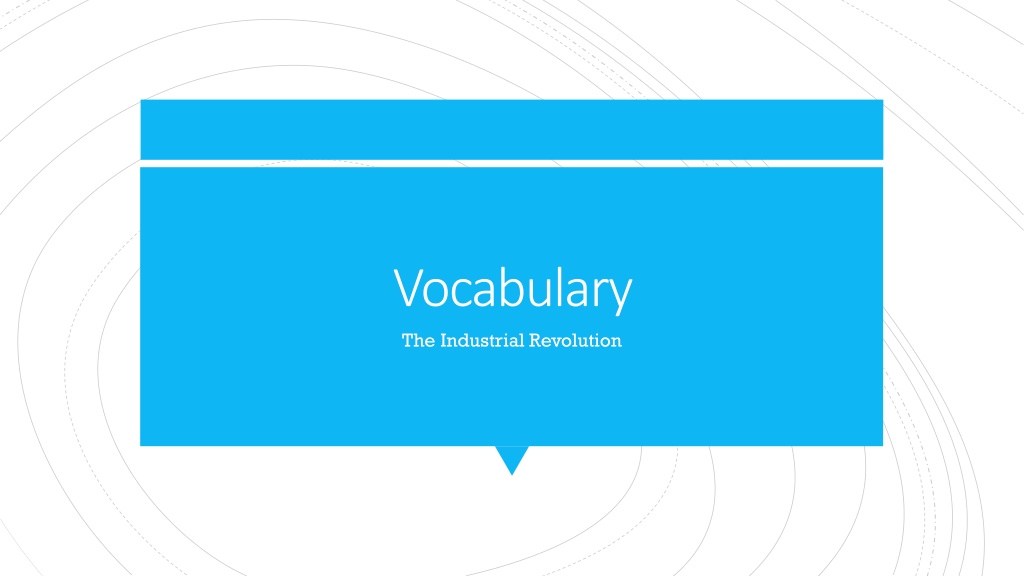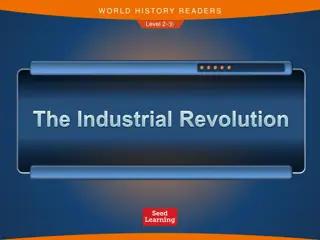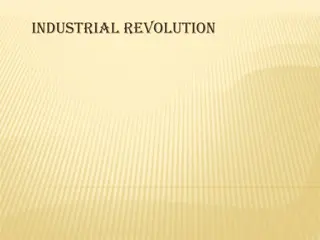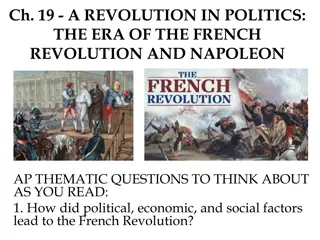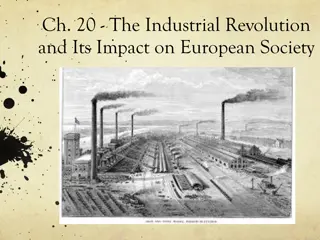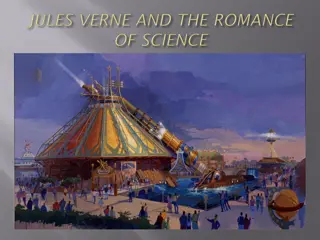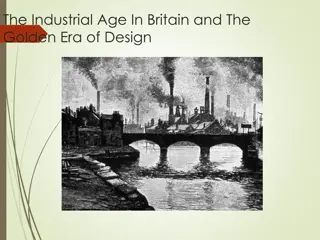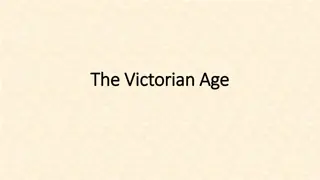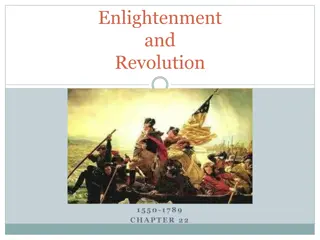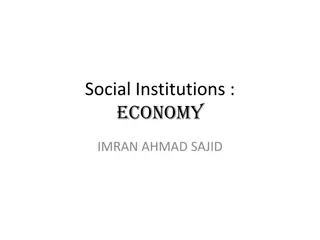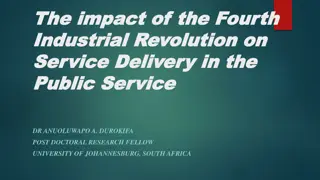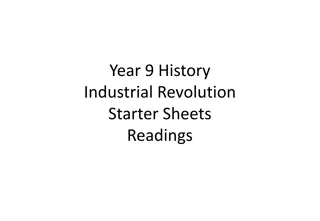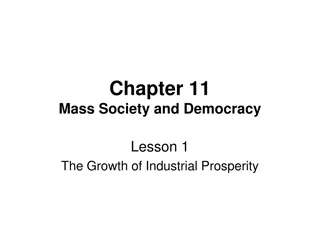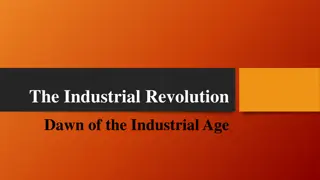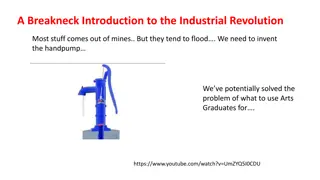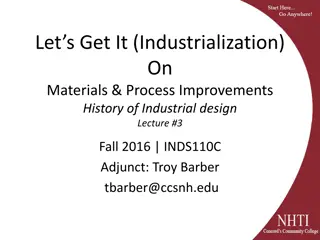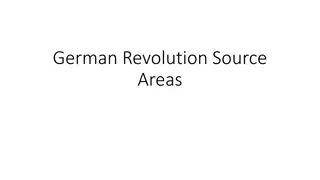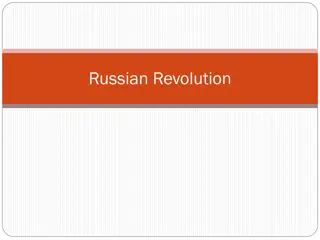Key Vocabulary Terms Related to the Industrial Revolution
Explore essential vocabulary words linked to the Industrial Revolution, including terms like bonds, capital, capitalism, corporation, demand, dividend, entrepreneur, industry, and infrastructure. Each term is defined and visually represented with images to aid comprehension and retention of the concepts.
Download Presentation

Please find below an Image/Link to download the presentation.
The content on the website is provided AS IS for your information and personal use only. It may not be sold, licensed, or shared on other websites without obtaining consent from the author. Download presentation by click this link. If you encounter any issues during the download, it is possible that the publisher has removed the file from their server.
E N D
Presentation Transcript
Vocabulary The Industrial Revolution
This is a certificate that promises to repay borrowed money-plus an additional amount of money, called interest (in our textbook, pages248-249). BONDS
Money or other resources used to create wealth (298) Capital
The economic system in which private citizens and companies own the means of production 298); an economic system based on private property and free enterprise. Capitalism
Type of business organization that is owned by many people, but treated by law as though it were a person (561). Corporation
Demand is an economic principle that describes a consumer's desire and willingness to pay a price for a specific good or service. Holding all other factors constant, an increase in the price of a good or service will decrease demand, and vice versa. Demand
A stockholders share of a companys profits, usually as a cash payment (561) Dividend
A person who starts a new business, introduces a new product, or improves a management technique (561). Entrepreneur
Any general business activity or commercial enterprise Industry
1. the basic,underlying framework or features of a system ororganization. 2. Infrastructure the fundamental facilities and systems serving a countr ycity,or area,as transportation and communication syst ems,power plants,and schools.
the theory or system of government that upholds the autonomous nature of the economy, and encourages little if any government interference. Laissez-faire HANDS OFF
Mass Production Factory production of goods in large quantities
Performed by machinery, especially to replace manual labor. Mechanization
A market where there is only one provider of a good or service. monopoly
Proprietorship a person who has the exclusive right or title to something;an owner, as of real property or a business
a contractual relationship between two or more persons carrying on joint business venture with a view to profit each incurring liability for losses and the right to share in the profits Partnership
a 19th-century theory, inspired by Darwinism, by which the social order is accounted as the product of natural selection of those persons best suited to existing living conditions and in accord with which a position of laissez-faire is advocated. The rich are better suited to wealth the poor are poor because that is their place and they serve a purpose. Social Darwinism
A combination of firms or corporations formed by a legal agreement, especially to reduce competition. trust
a number of persons,states,etc.,joined or associated to gether forsome common purpose: Unions
PEOPLE Of The Industrial Revolution
Steel Industry- Railroads before, as a student Scottish Immigrant Uber-wealthy Philanthropist Andrew Carnegie Libraries Anti-Imperialist Supported worker s rights but destroyed unions Homestead strike- Pinkerton-organized street fight 10 dead
American Oil Industry Richest person in American History John D. Rockefeller His business practices lead to anti-trust laws Standard Oil Super-business guy- by age 25 he was already wealthy on his own
also known informally as "Commodore Vanderbilt", was an American business magnate and philanthropist who built his wealth in railroads and shipping.[2][3]Born poor and having only a mediocre education, Vanderbilt used perseverance, intelligence, and luck to work his way into leadership positions in the inland water trade and invest in the rapidly growing railroad industry. He is known for owning the New York Central Railroad. Cornelius Vanderbilt As one of the richest Americans in history and wealthiest figures overall, Vanderbilt was the patriarch of a wealthy, influential family. He provided the initial gift to foundVanderbilt University in Nashville, Tennessee. Stolen from Wikipedia
American industrialist and inventor of the Pullman sleeping car, a luxurious railroad coach designed for overnight travel. In 1894 workers at his Pullman s Palace Car Company initiated the Pullman Strike, which severely disrupted rail travel in the midwestern United States and established the use of the injunction as a means of strikebreaking George Pullman Stolen From Encyclopedia Brittanica
http://www.pbs.org/wgbh/theymadeamerica/whomad e/drake_hi.html Edwin Drake Cool Story, Bro.. So let s read it
Airplanes Wilbur and Orville Wright Kittyhawk Watch PBS on your own time
http://www.sil.si.edu/ondisplay/langley/intro.htm This dude is way too cool for my own words. Let us follow this trail But first, the question: Is he a Necessity is the mother of innovation dude (Necessity is the mother of invention definition. A need or problem encourages creative efforts to meet the need or solve the problem. This saying appears in the dialogue Republic, by the ancient Greek philosopher Plato) or a Visionary (by Sarah Crabtree- here and now, sort of). Samuel Langley
SPONSER of the development of the American Assembly Line- Olds technically invented it (Oldsmobile). Five basic principles partly derived from other industries shaped Ford s assembly lines: interchangeable parts, single- function machines, sequential ordering of machines, continuous flow of materials to workers via slides and belts, and precise division of labour. Henry Ford
American entrepreneur and engineer based in Pittsburgh, Pennsylvania who invented the railway air brake and was a pioneer of the electrical industry, gaining his first patent at the age of 19. George Westinghouse Too cool for me again- https://www.britannica.com/biography/George- Westinghouse
First telegraph wire across the Atlantic Cyrus Field
Invented the adding machine: NOT to be confused with the angsty writer William S. Burroughs of the Beat Generation who wrote Naked Lunch William Burroughs We will endeavor to halt the Industrial Revolution before it is too late, to regulate population at a reasonable point, to eventually replace quantitative money with qualitative money, to decentralize, to conserve resources. The Industrial Revolution is primarily a virus revolution, dedicated to controlled proliferation of identical objects and persons. Just an anti- IR perspective from the Beatnik Generation
. Latimer made the lightbulb more practical and contributed to the invention of the first telephone. Background: Latimer was born in Chelsea, Mass. His parents were slaves who had escaped from Virginia. Lewis Latimer
invented the gasoline powered vacuum cleaner (which he called the "pneumatic carpet renovator") in 1899. His vacuum was patented on Oct. 3, 1899 (patent #634,042). It may have been the first motorized vacuum cleaner. John Thurman Another Wikipedia theft
American inventor who held more than 50 patents. He is also the first American of African ancestry to be a mechanical and electrical engineer after the Civil War. Granville Woods Stolen (again)
Charles Emil Sorensen was a Danish-American principal of the Ford Motor Company during its first four decades. Charles Sorenson
